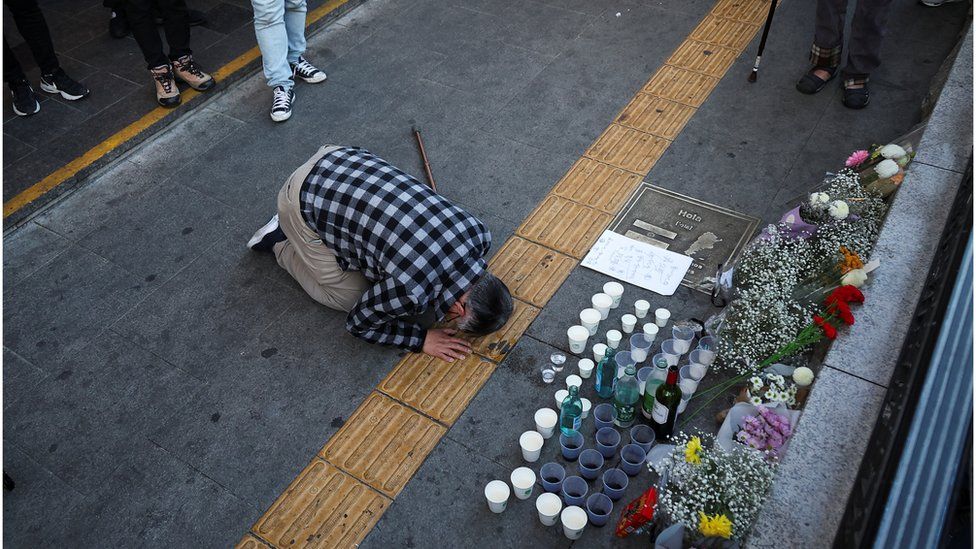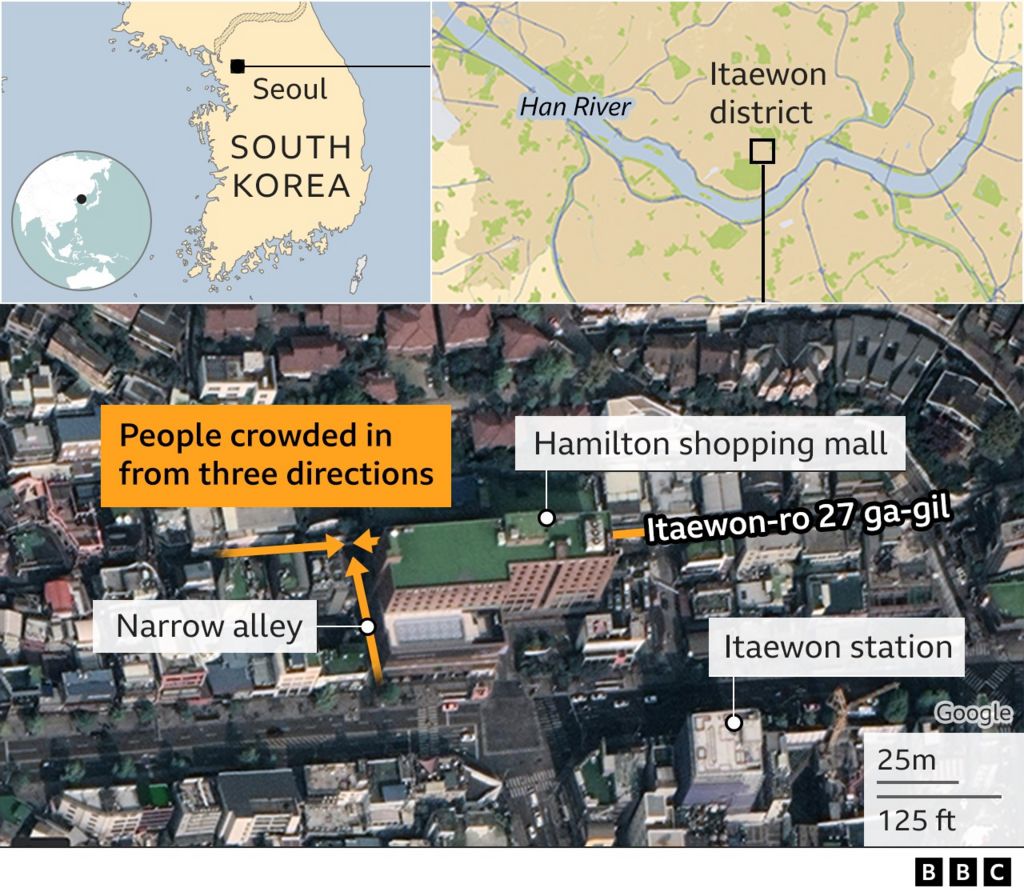



A person pays tribute near the scene of the stampede during Halloween festivities, in Seoul
By early evening on Saturday, thousands of mainly young people had converged in Itaewon in the centre of the South Korean capital, a lively party spot whose warren-like streets and alleys are filled with bars and restaurants.
Some accounts say 100,000 people had descended on the area to celebrate Halloween, excited about the prospect of partying again after two years of strict Covid restrictions in the country.
Nuhyil Ahammed, 32, was among the crowd. The IT worker from India lives nearby and had been to Halloween parties in Itaewon for five years running.
Last year the celebrations had been lively, but under control, with police preventing people from entering busy areas. Things were very different this year, he said.
"It was crazy," he told the BBC. "From 5pm there were too many people on the streets. So I was thinking, what's it going to be like from seven or eight?"
Around this time, social media messages were being posted online with people saying that the streets of the district were so crowded they felt unsafe.
Mr Ahammed and a group of friends spent the evening in Itaewon, hanging around a narrow, sloping alley off the district's main street that was about to become the main focus of the tragedy.
"We always go to this alley," he said. "I don't know why, but there are always good bars and people in costume."
By 11pm it was clear something was wrong, and an alarmed Mr Ahammed found himself caught up in a huge crowd of people.
"People began pushing from behind, it was like a wave - there was nothing you could do," he said. "Even if you were standing still, someone was pushing you from the back and from the front."

Mr Ahammed fell to the ground but managed to climb above the crowd up some steps along the side of the alley.
It was about 22:20 local time (13:20 BST) when the situation turned desperate. A number of people on the slope fell over, causing a massive crush. Crowds pressing from both ends of the narrow street meant no one could get out..
"People were suffocating, screaming... getting squeezed... falling... there were just too many people," the 32-year-old said.
"I was on the step just watching everything happening, people taking their last breaths... I was just helpless looking at those people suffocating."
Ana, a 24-year-old from Spain was also in the area, with her friend, Melissa, a 19-year-old from Germany. The pair were in a bar and tried to leave at 23:00 local time (14:00 BST) when they saw ambulances entering the alley and police asking people to move to make way for dead bodies and the injured.
"There were so many people that they needed normal people to do CPR. So everyone started jumping in and help," Ana told the BBC.
She said that two friends who knew CPR had gone to help, but that some people had died in their hands.
Ana then went to help, listening to instructions being given to her.
"They were telling me how to hold their heads and open their mouths, and things like that. I was trying to help but they were both dead as well. I have to say all the people they were bringing in to do CPR, most of them were already not breathing so they couldn't do anything."
"We couldn't do anything, that was the main trauma," she said.
Videos from the scene show dozens of people attempting CPR on bodies lining the street. A BBC reporter on the ground said they saw a number of ambulances, thousands of people, and many bodies covered with blue sheets. Ambulances struggled to get through the crowds of people.
As is often the case in a fast-moving tragedy like this, news about what had happened was emerging piecemeal.
Initial reports said that about 50 people had suffered cardiac arrests - a common cause of death during a crush - but it was clear from grim photographs of body bags lining the streets that this was a major incident.
The first confirmed death toll was issued at 02:30 local time (17:30 BST). Official said that 59 people had died and a further 150 were injured. An hour later the numbers had jumped to 120 dead with 100 injured, and climbed further still as the night wore on, soon surpassing 150.
Mr Ahammed said that even hours after the crush occurred people in the area were still partying, with music still being heard coming from some of the bars and clubs in the area. It's not clear if these venues and their patrons were aware of the seriousness of what was happening around them.
Within hours of the tragedy unfolding South Korea's President Yoon Suk-yeol had held an emergency meeting, and announced an investigation into the cause of the crush. On Sunday morning he announced a period of national mourning.
"My heart is heavy and I struggle to cope with my grief," he said, adding that he felt "responsible for people's lives and safety".
There is usually a hive of activity around Itaewon on Sunday afternoons, but the day after the tragedy many shops, restaurants and cafes were closed, and the area's main street was sealed off. A local resident told the BBC she was shocked at the sight of body bags along the street.
As the country grapples with how the tragedy unfolded, attention will inevitably shift to safety standards and crowd control measures, as people ask if more could have been done to avoid this tragedy.
-- Courtesy of BBC Sport